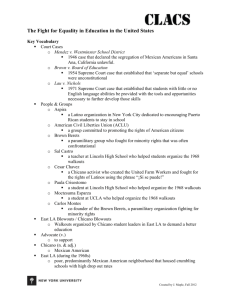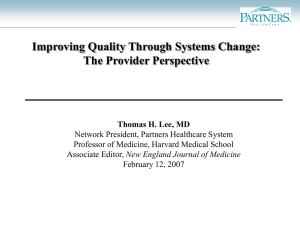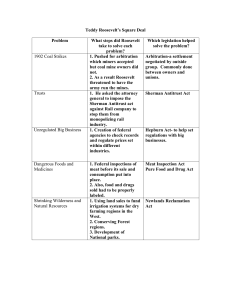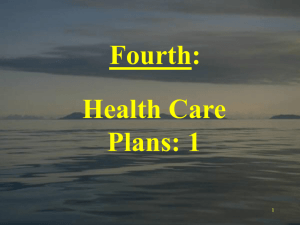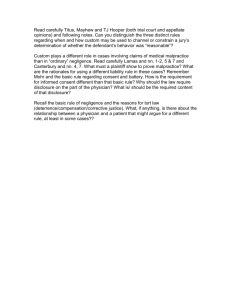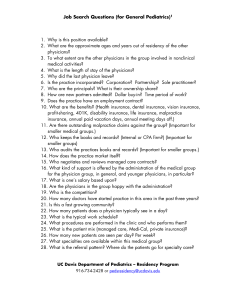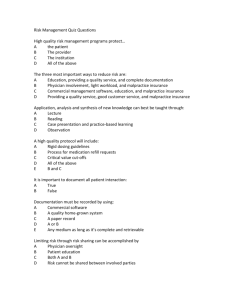Antitrust & Trade Regulation Physician Walkouts: Antitrust Violations or Protected Political Activity?
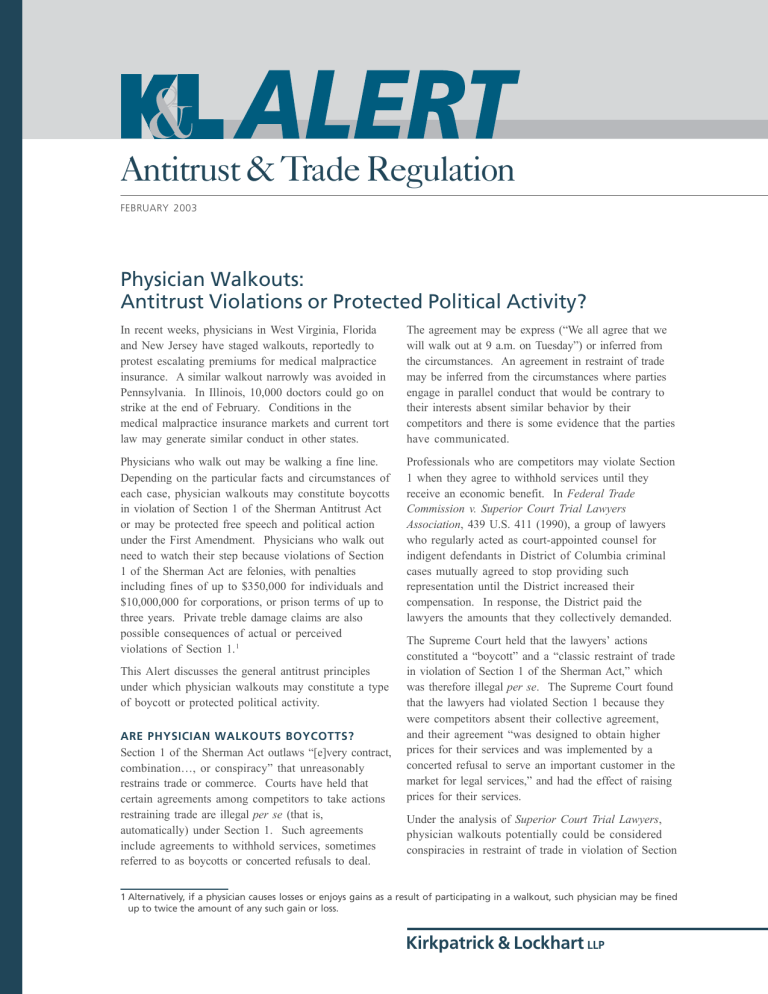
Antitrust & Trade Regulation
FEBRUARY 2003
Physician Walkouts:
Antitrust Violations or Protected Political Activity?
In recent weeks, physicians in West Virginia, Florida and New Jersey have staged walkouts, reportedly to protest escalating premiums for medical malpractice insurance. A similar walkout narrowly was avoided in
Pennsylvania. In Illinois, 10,000 doctors could go on strike at the end of February. Conditions in the medical malpractice insurance markets and current tort law may generate similar conduct in other states.
Physicians who walk out may be walking a fine line.
Depending on the particular facts and circumstances of each case, physician walkouts may constitute boycotts in violation of Section 1 of the Sherman Antitrust Act or may be protected free speech and political action under the First Amendment. Physicians who walk out need to watch their step because violations of Section
1 of the Sherman Act are felonies, with penalties including fines of up to $350,000 for individuals and
$10,000,000 for corporations, or prison terms of up to three years. Private treble damage claims are also possible consequences of actual or perceived violations of Section 1.
1
This Alert discusses the general antitrust principles under which physician walkouts may constitute a type of boycott or protected political activity.
ARE PHYSICIAN WALKOUTS BOYCOTTS?
Section 1 of the Sherman Act outlaws “[e]very contract, combination…, or conspiracy” that unreasonably restrains trade or commerce. Courts have held that certain agreements among competitors to take actions restraining trade are illegal per se (that is, automatically) under Section 1. Such agreements include agreements to withhold services, sometimes referred to as boycotts or concerted refusals to deal.
The agreement may be express (“We all agree that we will walk out at 9 a.m. on Tuesday”) or inferred from the circumstances. An agreement in restraint of trade may be inferred from the circumstances where parties engage in parallel conduct that would be contrary to their interests absent similar behavior by their competitors and there is some evidence that the parties have communicated.
Professionals who are competitors may violate Section
1 when they agree to withhold services until they receive an economic benefit. In Federal Trade
Commission v. Superior Court Trial Lawyers
Association, 439 U.S. 411 (1990), a group of lawyers who regularly acted as court-appointed counsel for indigent defendants in District of Columbia criminal cases mutually agreed to stop providing such representation until the District increased their compensation. In response, the District paid the lawyers the amounts that they collectively demanded.
The Supreme Court held that the lawyers’ actions constituted a “boycott” and a “classic restraint of trade in violation of Section 1 of the Sherman Act,” which was therefore illegal per se. The Supreme Court found that the lawyers had violated Section 1 because they were competitors absent their collective agreement, and their agreement “was designed to obtain higher prices for their services and was implemented by a concerted refusal to serve an important customer in the market for legal services,” and had the effect of raising prices for their services.
Under the analysis of Superior Court Trial Lawyers, physician walkouts potentially could be considered conspiracies in restraint of trade in violation of Section
1 Alternatively, if a physician causes losses or enjoys gains as a result of participating in a walkout, such physician may be fined up to twice the amount of any such gain or loss.
Kirkpatrick & Lockhart
LLP
1 of the Sherman Act if they meet two conditions.
First, the physicians participating in a walkout must be competitors who have entered into an agreement to withhold their services. Second, as a result of the walkout, the physicians must obtain an economic benefit by interfering with the free market, such as by forcing insurers to lower premiums for medical malpractice insurance.
ARE PHYSICIAN WALKOUTS
PROTECTED POLITICAL ACTIVITY?
The First Amendment protects free speech and the right to petition the government for redress of grievances.
The courts generally have been solicitous in upholding these First Amendment rights. In the area of antitrust law, the courts have evolved a doctrine to protect these rights. This doctrine, known as the
Noerr-Pennington doctrine after the leading cases, generally provides that efforts to petition the government for the passage of legislation or other government action are immune from the application of the antitrust laws. The Noerr-Pennington doctrine protects from antitrust challenge collective or concerted actions intended to secure the passage of legislation, even if such conduct leads to legislation with anticompetitive effects or if the legislation will benefit the petitioner and harm its competitor. The
Noerr-Pennington doctrine has been applied and upheld in the specific context of boycotts.
In Missouri v. National Organization for Women, Inc.,
620 F.2d 1301 (8 th Cir. 1980), the National
Organization for Women (“NOW”) organized a convention boycott against all states that had not ratified the proposed Equal Rights Amendment.
Missouri sought injunctive relief against the boycott because Missouri motels and restaurants catering to the convention trade were suffering revenue losses.
The United States Court of Appeals for the Eighth
Circuit held that the Sherman Act does not prohibit boycotts “for the purpose of influencing legislation.”
Significantly, the Eighth Circuit also found that
NOW’s campaign to publicize the boycott was not a mere sham to cover up anticompetitive actions. The
Eighth Circuit thereby implied that boycotts staged as part of publicity campaigns intended to effect legislative change will be exempt from Sherman Act liability as long as such publicity campaigns are designed to cause legislative change and are not shams intended to disguise harm to the free market.
Under the analysis stated in NOW, physician walkouts may not violate Section 1 of the Sherman Act if the physicians’ purpose is to influence legislatures to adopt legislation limiting medical malpractice insurance premiums or to enact tort reform. NOW also suggests that physician walkouts may violate Section 1 of the
Sherman Act where the publicly avowed goal of obtaining legislative change is a mere sham, and the real goal is to force insurers to reduce medical malpractice insurance premiums or to obtain some other economic benefit by interfering with the free market.
A critical factor in determining whether a physician walkout is a conspiracy in restraint of trade or protected political activity is the likely manner in which such walkouts will achieve the physicians’ goals. On the one hand, such walkouts may be deemed boycotts in restraint of trade if the physicians agree to walk out, and the walkouts force insurers to reduce medical malpractice premiums. On the other hand, such walkouts may be deemed protected free speech and political activity if they attempt to influence legislatures to enact tort reform or legislation regulating medical malpractice insurance premiums.
Physicians who participate in walkouts thus may find themselves walking a tightrope between illegal economic activity and legitimate political expression.
JAMES E SCHEUERMANN jscheuermann@kl.com
412.355.6215
MATTHEW R DASCENZO mdascenzo@kl.com
412.355.6549
K&L’s Antitrust and Trade Regulation practice provides comprehensive antitrust counseling to clients on achieving business objectives while complying with the antitrust laws. If you have any questions regarding the subject matter discussed in this Alert, please contact one of the following attorneys:
James E. Scheuermann 412.355.6215 jscheuermann@kl.com
Thomas A. Donovan 412.355.6466 tdonovan@kl.com
Kirkpatrick & Lockhart
LLP
®
Challenge us.
® www.kl.com
BOSTON n DALLAS n HARRISBURG n LOS ANGELES n MIAMI n NEWARK n NEW YORK n PITTSBURGH n SAN FRANCISCO n WASHINGTON
.........................................................................................................................................................
This publication/newsletter is for informational purposes and does not contain or convey legal advice. The information herein should not be used or relied upon in regard to any particular facts or circumstances without first consulting a lawyer.
©
2003 KIRKPATRICK & LOCKHART LLP. ALL RIGHTS RESERVED.
